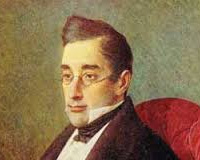Alexander Griboyedov was born in Moscow, 15th Jan. 1795. He entered Moscow University in 1810. He entered military service in 1812. He began his literary career in 1814. His first play was Young Spouses which was staged in St. Petersburg in 1815.In 1817, he entered the high school of ministry of foreign affairs and became a member of...
Alexander Griboyedov was born in Moscow, 15th Jan. 1795. He entered Moscow University in 1810. He entered military service in 1812. He began his literary career in 1814. His first play was Young Spouses which was staged in St. Petersburg in 1815.
In 1817, he entered the high school of ministry of foreign affairs and became a member of its staff. Shortly after the play of his last work, he was sent to Iran as the secretary to the Russian political mission to Iran. In 3rd Feb. 1819, he arrived at Tabriz and then proceeded to Tehran. Eventually he returned to Georgia and took with him some Russian subjects who had remained in Iran since the first Iran o Russian war.
Again, Griboyedov came to Iran in early February 1820. Prior to this he married Nina Chavchadze, daughter of Alexander Chavchadze, the Georgian poet.This time he stayed there until November 1821. Upon his return to Tiflis, he was appointed the charge d’ affairs the Russian delegation headed by Ermolov. Following his mission, he returned to Moscow and St. Petersburg in February 1823.
In late 1825, again he left to Caucasus in the company of General Ermolov. A few months later he was arrested on the accusation of participation in an intrigue against Nicholas II. He was condemned to four months imprisonment. And after that he was released.
In the meantime, the second Iran o Russian war began in 16th Jan. 1826. Griboyedov was commissioned to act as secretary to General Paskevich in Caucasian headquarters. He entered Tiflis in 3rd September. He was there in the front until the end of the war.
Upon the end of Iran o Russian war, Turkmanchay treaty was prepared by Greiboyedov and was concluded between Asefoddowleh and Iranian minister of foreign affairs, 22nd Feb. 1828 and according to the 16th chapter of the treaty he was commissioned to take the treaty to St. Petersburg for the emperor to get it ratified. In the capital he received a new commission which was supervision of the implementation of the treaty and also trying to get war reparations from Iran. He was fearful of his new commission. He arrived at Tabriz in 17th Oct. 1828 and after a short stay proceeded to Tehran in 20th December, entering the capital in 11th Jan. 1829. The next day after his arrival he had an audience with Fathali shah and submitted his credentials. Shortly after the formalities, he adopted a snobbish manner which made both the shah and courtiers and the laymen very angry.
In the meantime another question showed itself leading to Tehran’s ordinary people’s riot; the question of the Armenian and Georgian women who had turned to Islam and lived in the houses of some leading figures of the country. Griboyedov considered them as Russian prisoners and according to the 13th article of the treaty and through the cooperation of the Armenian Agha Yaghub, one of the of the eunuchs of Fathali Shah’s court who knew Iranian families well, Griboyedov tried to make inspections in the houses of the leading men to find these women. This attitude of him was in direct opposition to the Islamic rules and incited the sentiments of people, so that led by Mirza Masih Mojtahed, they started an offensive against Russian embassy, and in the fight between them and the Russian subjects, and all members of the Russian legation except Maltsev who was the first secretary were killed. The riot was so fierce that it might end in another war. However, Khosrow Mirza, Abas Mirza’s son was sent to Moscow with a letter from the Qajar Shah to announce his apology because of the murder of the Russian envoy. They reached a conciliation and Mirza Massih was exiled to the holy cities of Iraq.
https://iichs.ir/vdcb.wb8urhb0fe4pr.html
iichs.ir/vdcb.wb8urhb0fe4pr.html
